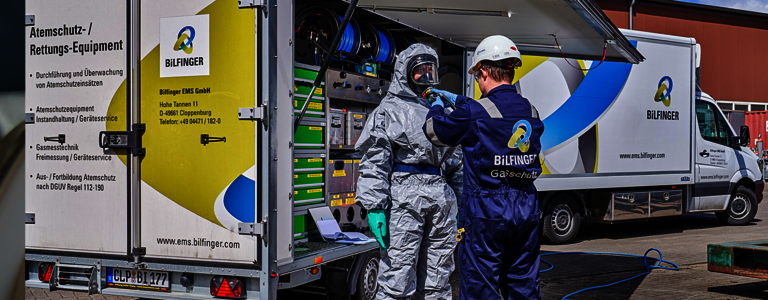
Not for the faint-hearted
With his frogman-style chemical protection suit and respiratory mask, the technician enters the tank to check the seals. Outside, the temperature is 38 degrees, but it’s even a lot hotter inside. For Bilfinger experts, getting the job done under extreme conditions is all in a day’s work.
The position of head of gas and respiratory protection is not one for the fainthearted. Andreas Wicht has been with Bilfinger for more than twelve years and knows all the ins and outs of respiratory protection. “Many of our customers have extreme safety requirements. On every job – some of which involve coming into contact with hazardous substances, such as mercury – we have to be prepared for all eventualities. Because when it comes to the crunch, human lives depend on our work,” says Wicht, who heads up gas and respiratory protection at Bilfinger EMS. Based in Cloppenburg, Germany, the company is a specialist in this field. The team is also responsible for all aspects of maintaining the equipment. “It’s one of our areas of expertise,” says Theodor Osteresch, one of two CEOs at Bilfinger EMS. “We carry out this work either at our own premises or directly at the customer’s. Our colleagues receive regular training either from equipment manufacturers or the relevant professional associations, such as the German Social Accident Insurance Institution for the Raw Materials and Chemical Industry (BG RCI). We make use of the very latest technology and testing software in order to repair and regularly calibrate devices.” Thanks to this service, the equipment is ready for use again in next to no time. That means downtimes are few and far between, which saves our customers time and money – a major advantage.
When it comes to respiratory protection and measuring devices, we rank among the best. That’s because we invest heavily in our equipment and employees’ qualifications."
A roughly 20-strong team is deployed at our customers’ sites around the clock, seven days a week, especially in the summer months. That’s peak season because it’s when industrial facilities are shut down on a wide scale for a general overhaul. “While a number of our customers are in the oil and gas industry, our expertise lets us also serve companies in other sectors – doing work they can no longer carry out themselves or prefer to outsource,” says Osteresch. “This includes chemicals companies, works fire departments as well as the automotive and aviation sectors where a lot of paintwork is performed. In those instances, our expertise and equipment provide significant added value to our customers.”
Another of Bilfinger EMS’ areas of activity is training courses, which are regularly held at our own or the customer’s premises. Participants receive instruction on all aspects of respiratory protection, including the relevant equipment. But the way the human body works and how people behave in certain situations is also a part of it. “Often, using respiratory protection devices is pretty much a case of mind over matter,” says Andreas Wicht. The course also covers first aid and instructions on how to use the lifesaving equipment. Sometimes, team members even step in to help with fighting fires under challenging conditions, such as when hazardous materials are involved. Thanks to their relevant experience and what are on occasion extremely high safety requirements, the Bilfinger EMS team is very well versed in matters of occupational safety. “We can’t afford to make any mistakes in our line of work,” emphasizes Theodor Osteresch. “After all, it’s always about protecting each and every one of our employees – and for us, that takes top priority.”
Photo 1: Precisely checking equipment is a matter of life or death.
Photo 2: Checking equipment is precision work requiring exact measurements.
Three Questions for Andreas Wicht

Andreas Wicht heads up gas and respiratory protection at Bilfinger EMS. The trained heating engineer with more than 20 years’ experience knows that acquiring a certain routine in this line of work is a long road.
What was the most exciting assignment you worked on so far?
Actually, every job is exciting because no two are the same. Safety requirements vary from industry to industry. Our working environments are also very diverse: We work on ships, at industrial facilities or in tanks with a diameter of up to 25 meters. There’s definitely never a dull day in this job.
Do you get your equipment regularly checked by a technical inspection association?
All regular inspection intervals are defined by law. Inspections have to be conducted every four weeks depending on the industry or the equipment. Since we have the requisite qualifications to maintain gas and respiratory protection equipment, we test all of our own gear as well as that being used by our customers ourselves. That means our customers enjoy an all-inclusive carefree package.
Why is maintaining the equipment so demanding?
The individual components built into gas measuring devices are highly complex. Prices range from 500 to 25,000 euros. Over the past few years, the devices have advance by leaps and bounds. Plus, some of the new regulations and legal requirements we need to comply with are so exacting that only a handful of devices are at all capable of taking those kinds of measurements. And due to stricter threshold values, technicians will increasingly need to wear more respiratory protection in the future. So our skills as technical service providers with the relevant equipment to hand are called for.


